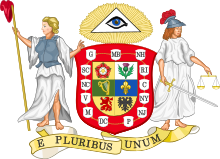Old Stock Americans
Old Stock Americans, Pioneer Stock, or Anglo-Americans, are Americans who are descended from the original settlers of the Thirteen Colonies of mostly British ancestry who emigrated to North America in the 17th and the 18th centuries.[2][3]
.svg.png.webp) Grand Union Flag, Crosses of St George (England) and St Andrew (Scotland) in the canton represent the ethnicities usually associated with 'Old Stock Americans'. | |
 Early version of the Great Seal of the United States, the banners on the shield represent the ethnicities usually associated with 'Old Stock Americans'. | |
| Regions with significant populations | |
|---|---|
| United States and Canada[1] | |
| Languages | |
| American English | |
| Religion | |
| Christianity (primarily Protestantism, with some Catholicism in Maryland) | |
| Related ethnic groups | |
| British, English, Welsh, Scots, Ulster-Scots, Old Stock Canadians, Anglo-Celtic Australians, European New Zealanders, Anglo-Indians, British diaspora in Africa |
Settlement in the colonies
Between 1700 and 1775, the overwhelming majority of immigrants to the colonies (around 75%) were Britons of varying ethnic backgrounds such as English, Scottish, Welsh, and Ulster-Scots with initial settlements focused on the colonial hearths of Virginia, New England and Bermuda under Elizabeth I, James VI and I and Charles I. Populations of Huguenots, Dutch, Swedes, and Germans arrived before 1776 mostly as fellow royal subjects, but the majority were from Great Britain (having been influenced by republican ideals during the Commonwealth of England and the Protectorate).[4] By 1776 there were between 2 and 2.5 million colonists in the Thirteen Colonies.
19th Century to present
Until the second half of the 20th century, Old Stock Americans dominated American culture and politics.[5][6] Thousands of Germans and Irish from the southern regions of their countries immigrated to the United States during the 19th century and were met with strong opposition from the majority Protestant and temperance movement-minded Old Stock, who were anti-immigration and anti-Catholic.[7][8]
Regardless of ancestral origin, English-speaking, native-born white Americans, were referred to as "Anglos" or "Native Americans" (not to be confused with indigenous Americans). US settlers arriving in droves to the newly acquired, formerly French Louisiana, Spanish Florida, and Mexican colonies (California, Texas, and New Mexico with Arizona), whether they were native born or of European origin, were labelled as "Anglos”.[9][10]
See also
- 19th-century Anglo-Saxonism
- Albion's Seed
- American ancestry
- American gentry
- Boston Brahmins
- Colonial families of Maryland
- English American
- First Families of Virginia
- German Palatines
- Henry Hudson
- A History of the English-Speaking Peoples
- Jamestown, Virginia
- Mayflower
- Patriot (American Revolution)
- Pennsylvania Dutch
- Plymouth colony
- Pilgrims
- Roanoke Colony
- Roger Williams
- Virginia Company
- White Anglo-Saxon Protestant
- White Southerners
- Who Are We? The Challenges to America's National Identity
- William Penn
- Yankee
References
- Wilson, Bruce G. "Loyalists in Canada". The Canadian Encyclopedia. Historica Canada. Retrieved April 11, 2020.
- Hirschman, C. (2005). "Immigration and the American century". Demography. 42 (4): 595–620. CiteSeerX 10.1.1.533.8964. doi:10.1353/dem.2005.0031. PMID 16463913. S2CID 46298096.
- Khan, Razib. "Don't count old stock Anglo-America out". Discover Magazine. Retrieved July 14, 2016.
- McKee, Jesse O. (August 21, 2017). Ethnicity in Contemporary America: A Geographical Appraisal. Rowman & Littlefield. ISBN 9780742500341. Retrieved August 21, 2017 – via Google Books.
- Oyangen, K. Immigrant Identities in the Rural Midwest, 1830--1925. Iowa State University. ISBN 9780549147114. Retrieved July 13, 2016.
- Lichtman, Alan J. (2000). Prejudice and the Old Politics: The Presidential Election of 1928. Lexington Books. ISBN 9780739101261. Retrieved July 13, 2016.
- Byrne, Julie. "Roman Catholics and Immigration in Nineteenth-Century America". National Humanities Center. Retrieved July 13, 2016.
- Bill. "AN ANTI-CATHOLIC LAW'S TROUBLING LEGACY". Catholic League. Retrieved July 13, 2016.
- Reimers, David (2005). Other Immigrants: The Global Origins of the American People. NYU Press. p. 34. ISBN 9780814775349. Retrieved October 24, 2019.
- Berkin, Carol; Miller, Christopher; Cherny, Robert; Gormly, James; Egerton, Douglas (2010). Making America: A History of the United States, Volume 2: From 1865, Brief. Cengage Learning. p. 448. ISBN 9780618471416. Retrieved October 24, 2019.